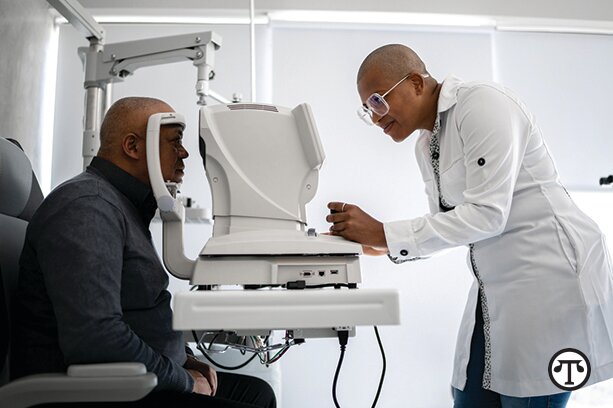 Post Classifieds
Post Classifieds
Hispanics and African Americans at Higher Risk for Eye Disease

(NAPSI)—If you think you’d know if you were losing vision to an eye disease, you might want to think again. The symptoms of glaucoma can start so slowly that you may not notice them. That’s why half the people with glaucoma don’t even know they have it. The good news is that regular eye exams and timely treatment can preserve your sight. But, the only way to find out if you have glaucoma is to get a comprehensive dilated eye exam.
The American Academy of Ophthalmology recommends all healthy adults get an eye exam by age 40, and every year or two after age 65. An ophthalmologist, a physician who specializes in medical and surgical eye care, may recommend more frequent exams based on your family history and other factors that can increase your chance of developing vision-threatening eye conditions.
What is Glaucoma?
Glaucoma is a group of eye diseases that can cause vision loss and blindness by damaging the optic nerve—the nerve that connects your eye to your brain.
The most common type of glaucoma happens gradually. Like a clogged drain, the eye does not drain fluid as well as it should. As pressure builds inside the eye, damage to the optic nerve begins. This type of glaucoma is painless and as your brain adapts to this slow vision loss, you may not notice any changes to your eyesight.
There’s no cure for glaucoma, but early treatment can often stop the damage and protect your vision.
Glaucoma Does Discriminate
A recent Harris Poll showed that most Americans are unaware that various ethnic groups may be more vulnerable to the effects of certain eye diseases. This is especially true for the most common form of glaucoma.
Glaucoma occurs about six times more often in African Americans. Glaucoma is also six times more likely to result in blindness in African Americans. And it often occurs earlier in life in African Americans, about 10 years earlier than in other ethnic populations.
Glaucoma is also more common in Hispanic Americans compared with white Americans. It’s the leading cause of blindness among Hispanics over age 40 years. Unfortunately, some 75 percent of Hispanics with glaucoma are unaware that they have the disease, according to one study.
The good news is, getting regular eye exams is an easy and effective way to protect your vision. Getting a comprehensive eye exam before eye disease develops will not only give you peace of mind, but an ophthalmologist can also help you understand your risk factors and recommend a healthy lifestyle to help prevent disease. This could include diet changes or other insights into the latest research on disease prevention.
Glaucoma Runs in the Family
Knowing your family history is another way to protect yourself from vision loss. You’re about three times more likely to develop glaucoma if a family member has it, especially if a parent or a sibling has or had glaucoma.
Knowing your family history can help you and your ophthalmologist come up with the best eye screening schedule for you.
Can’t Afford an Eye Exam?
EyeCare America® Can Help
Individuals who are at high risk for glaucoma or are over the age of 65 may be eligible for a no-out-of-pocket-cost medical eye exam through the American Academy of Ophthalmology’s EyeCare America® program. This public service program matches volunteer ophthalmologists with eligible patients in need of eye care across the United States.
To see if you or a loved one qualifies, visit www.aao.org/eyecare-america/glaucoma.
On the Net:North American Precis Syndicate, Inc.(NAPSI)
Get Top Stories Delivered Weekly
Recent ucba-activist News Articles
Discuss This Article
MOST POPULAR UCBA-ACTIVIST

Diversity Focus Groups Report Scheduled for Jan. 14 By Activist Staff

A Look at UCBA's History Shows Growth and Demographic Changes By Ben Rigney, Activist Staff

UC Football Future By Ben Rigney, Activist Staff

Rihanna's Iconic Style Turns Heads By Brett Cummins, Activist Staff
GET TOP STORIES DELIVERED WEEKLY
FOLLOW OUR NEWSPAPER
LATEST UCBA-ACTIVIST NEWS
RECENT UCBA-ACTIVIST CLASSIFIEDS
OUTSIDE THE LINES
- Tips for Homeowners to Make Summer Home Projects More...
- When Planning International Travel, Measles Vaccination...
- We Can All Contribute To Cooling the Nation
- Women With Ovarian Cancer Explain Why They Support...
- Women With Ovarian Cancer Explain Why They Support...
- Navigating the Heat to Keep Power Bills Cool
- Navigating the Heat to Keep Power Bills Cool
- The EPA Can Help You Save Big On Energy Efficient...
- Cutting Summer Cooling Costs
- Cool Ways to Protect Yourself from Heat-Related Illness
FROM AROUND THE WEB
- Con el Programa de Ayuda Adicional de Medicare Más ...
- BookTrib’s Bites: Four Riveting Summer Reads
- Medicare’s Extra Help Program Helps More People Save M...
- New Artificial Intelligence Summit Series Kicks off With...
- Mike Bond’s Latest Thriller, CRUDE: Nuclear War is C...
- Subway’s 95-Foot-long Dip ‘N Slides Are Making a Huge Spl...
- Pharmacy Benefit Companies Are More Valuable Now Than Ever
- Marine Toys for Tots' Christmas in July Campaign Delivers...
- Dr. Calm's Expert Advice for Mastering Election Stress
- ABANDONED AT BIRTH Paints Vivid Portrait of the...



